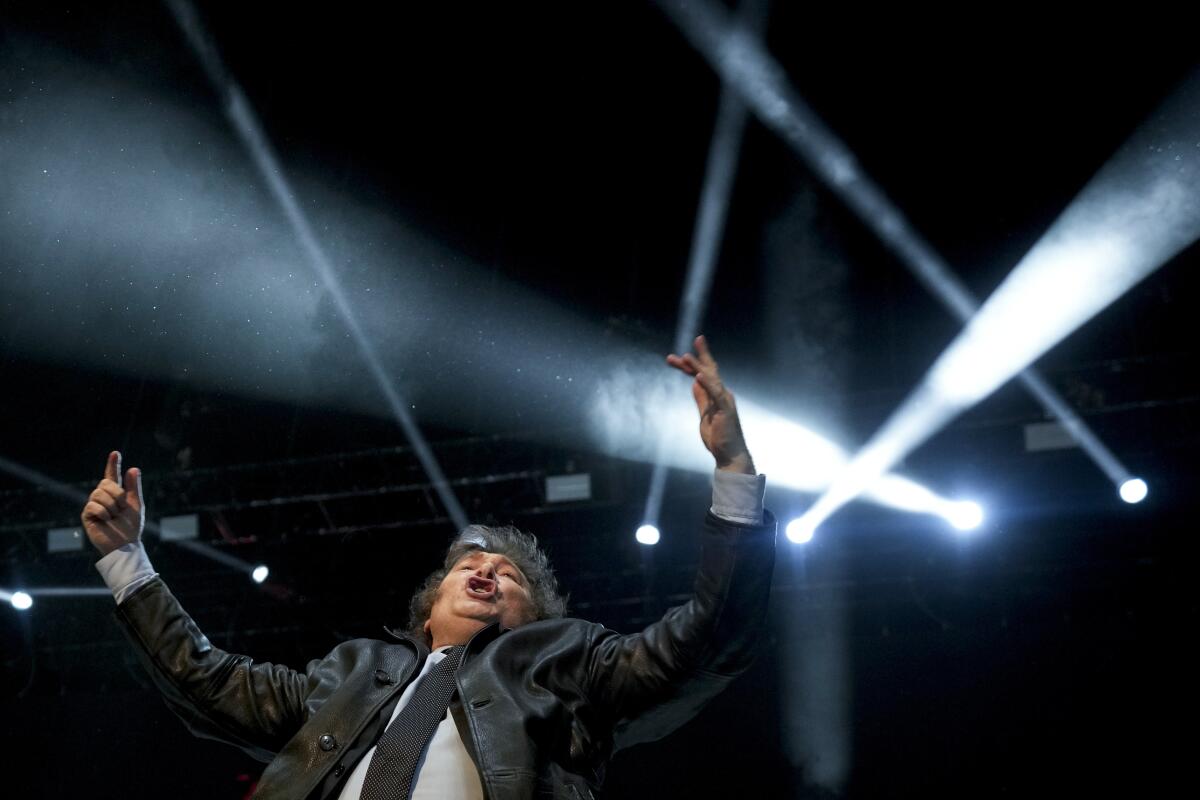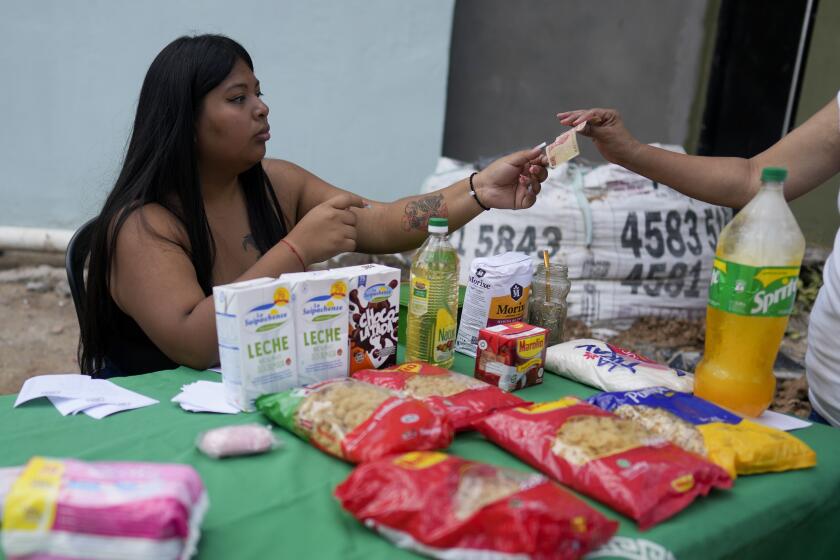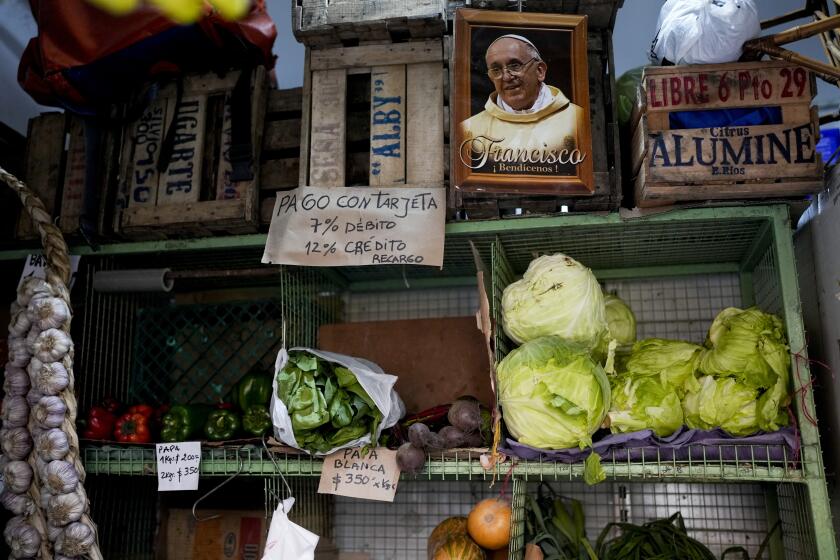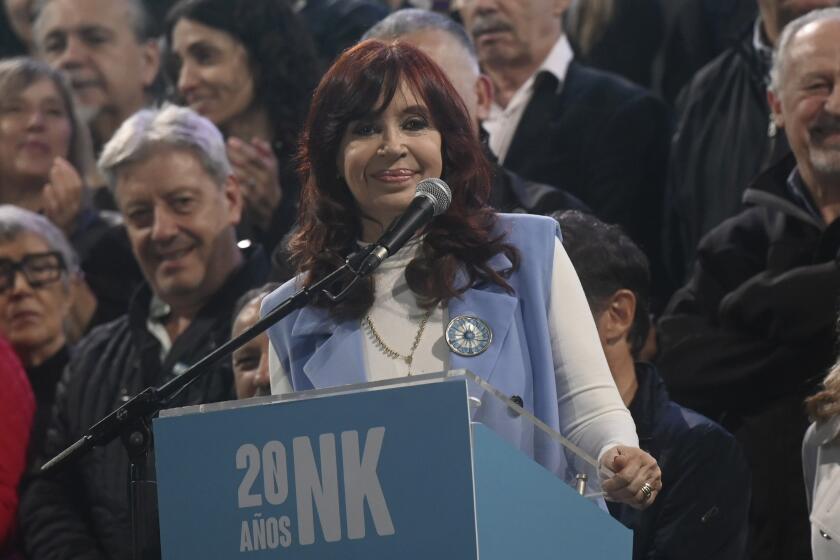Desperate and disaffected, Argentine voters consider casting their lot with a right-wing upstart

- Share via
BUENOS AIRES — Once an activist in a left-leaning youth movement, Rubén Dávalos is now among the millions of disaffected voters in Argentina planning to cast their ballots for right-wing populist and self-described anarcho-capitalist, Javier Milei.
“In this country, you can’t plan for the future,” said the 30-year-old Dávalos, who began selling cellphone accessories at flea markets after surging inflation ate away at his manufacturing job wages. “I know I’m going to die poor.”
Milei, a pundit-turned-presidential candidate, has captivated the downtrodden, and most polls show him with a slight lead heading into Sunday’s election in South America’s second-largest economy. Earlier this year, his eyebrow-raising bluster seemed more like a sideshow to boost television ratings than the launch of a viable candidacy — until he shocked the political establishment by winning the most votes in the August primary.
Polls indicate Milei will fall short of the votes needed to avoid a November runoff. Most show Economy Minister Sergio Massa of the ruling center-left Union for the Homeland coalition in second place, followed by former Security Minister Patricia Bullrich of the main opposition coalition United for Change.
Millions of Argentines are struggling to make ends meet as their country’s annual inflation rate clocked in at a staggering 102.5% in February.
“With the economy staring into the abyss, the upcoming election is arguably one of the most important ones in Argentina’s recent history,” Kimberley Sperrfechter, an emerging markets economist focused on Latin America at Capital Economics, wrote in an analysis this week.
Argentines are “facing the choice between more of the same policies that put the country in this situation in the first place” and “a shock-therapy style approach to tackle the country’s economic issues,” she said.
Milei rose to prominence as a television commentator who angrily blasted the country’s “political caste” as parasites while the wider population suffers. His message resonated in a country where even those with jobs often feel they are frantically hustling to stay where they are. Many have fallen behind; over the last seven years, Argentina’s poverty rate has jumped 10 percentage points to 40%.
Much like former U.S. President Donald Trump and Jair Bolsonaro of Brazil, Milei has won broad support by scoffing at politically correct niceties while presenting himself as an outsider capable of rescuing his distressed nation. Denouncing socialism has been a constant throughout his campaign, and he says halting its advance globally is a mission he shares with Trump and Bolsonaro, who has endorsed him.
Far-right populist Javier Milei has rocked Argentina’s political establishment by emerging as the biggest vote-getter in the presidential primary.
Whoever wins will inherit a slew of economic troubles, including the spectacular challenge of paying down a crushing $44-billion debt to the International Monetary Fund. Milei pledges to slash government spending, eliminate the central bank and dollarize the economy to put the brakes on inflation currently running at 140% annually. And he assures voters there is nothing to fear about his audacious proposals.
“These are the most important elections of the last 100 years,” Milei told a rally in Buenos Aires on Wednesday. “Let’s not resign ourselves to nothing changing. Let’s not resign ourselves to becoming poorer every day.”
As he spoke, the adoring crowd repeatedly chanted: “The caste is afraid!”
But his support is somewhat volatile, given that much of it stems from younger voters whose ideologies aren’t solidified and who are easily swayed by social media, said Andrei Roman, chief executive officer of Brazil-based polling firm Atlas Intel, whose latest survey shows Massa ahead. Roman noted that about 40% of respondents who didn’t vote in the August primaries and plan to vote Sunday say they will cast their ballots for Massa.
To rally support, Massa has issued stark warnings about what he says Milei’s plans for public spending cuts would mean for social welfare programs, education and healthcare. Such fear mongering may be a key reason he has remained competitive, according to Lucas Romero, head of Synopsis, a local political consultancy.
Inflation has been a problem across the world, but Argentina is second in a World Bank ranking of countries with the highest food inflation.
Valeria Jiménez, a 28-year-old retail worker, says she will vote for Massa — though she is hardly enthused by the prospect.
“I don’t see another option; the other ones scare me,” said the resident of a middle-class neighborhood of Buenos Aires.
Some of the trepidation around Milei stems not just from the unknowns of his planned economic policy, but also the socially conservative talking points he has touted on the campaign trail.
He opposes abortion, which is legal in Argentina, and has said sex education is a left-wing plot to destroy the family. Milei is also in favor of relaxing gun control laws and rejects the notion of human-caused climate change.
His libertarianism can take on peculiar contours: He says the law shouldn’t prevent people from selling their organs and openly pondered whether selling one’s children could be a legitimate personal choice.
Much of his agenda would depend on building alliances in Congress. His party’s legislative candidates stand to ride Milei’s coattails to dozens of congressional seats in Sunday’s election — when Argentines will vote for just over half of lawmakers in the lower house and one-third in the Senate.
A judge in Argentina has dismissed a long-running money laundering case against Vice President Cristina Fernández de Kirchner.
Bullrich, the former security minister who most polls show in third place, has been seeking to persuade voters that she, as a member of a party with a track record of governorships and experience negotiating legislation, is the candidate capable of bringing about reform to Argentina. She is pushing for more business-friendly policies and, like Milei, lower public spending.
Her argument has convinced some voters, including Mariano Peracca, a 38-year-old lawyer.
Bullrich “is the best expression of change and ... has a consolidated team in all areas in which power is wielded,” Peracca said.
Milei, however, has billed the established relationships and experience of Bullrich and Massa as a reflection of the entrenched elite that must be dislodged.
That message has resonance with some voters.
“The politicians in this country stole so much money and caused so much suffering to my family,” said Benjamin Correa, a 17-year-old high school student at Milei’s rally Wednesday. “With Javier Milei, we are going to have a 180-degree change.”
Associated Press journalists Almudena Calatrava, Natacha Pisarenko and David Biller contributed to this report.
More to Read
Sign up for Essential California
The most important California stories and recommendations in your inbox every morning.
You may occasionally receive promotional content from the Los Angeles Times.

















